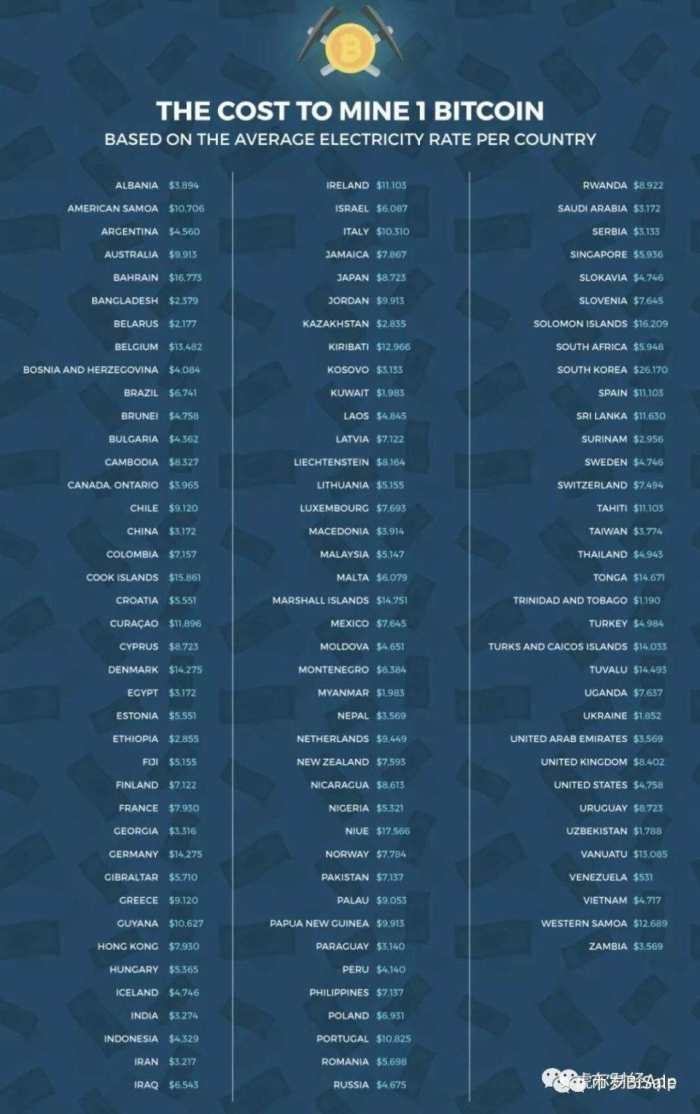All along, the so-called "mining" in the "currency circle" or "chain circle" is a hot topic. Last December, when the price of Bitcoin hit a peak of 20,000 U.S. dollars, almost all mainstream media began to pay attention to "mine mining" related activities. So where exactly is "mining" the cheapest?
Recently, a large number of “miners” went to Iceland in droves, not only because of the relatively pleasant and mild environment, but more importantly, Iceland’s abundant hydroelectric power.
A survey conducted by Elite Fixtures shows that the cost of “mining” across the globe varies greatly from region to region: from a minimum of US$531 to a staggering US$26,170. This survey report is based on electricity rates provided by 115 different countries and regions, and calculates the electricity cost required to “dig” a Bitcoin.
From this table it can be seen that the cost of mining a new bitcoin in China is $3,172. Of the 41 countries, China is currently in the middle. In the United States and Russia, as well as Iceland, which was mentioned earlier, the costs of such "coal mining" countries were US$4,758, US$4,675 and US$4,746 respectively. In our neighboring country, South Korea, due to the government's strict control over the capital of Bitcoin's market, the cost was as high as 26,170 U.S. dollars, making it the world's most expensive place for mining.
According to the data provided by Coindesk, based on the current price of Bitcoin, people who invest in "mining" can still benefit from it. However, some statements have pointed out that “coal mining: the critical point of breaking even. A market research company in New York said that the price of Bitcoin will reach the breakeven price index of 1.0x, which means “mine mining”. The value of the rewards to be rewarded will be equal to the cost of its total investment.When the Bitcoin price peaked in December last year, the breakeven price index was 3.5x.
On the one hand because of the "dig" to a bit Electricity consumed in currency (cryptocurrency) continues to rise, followed by increasing input costs.
In fact, the energy consumed by “mining” has already surpassed the level of electricity consumed by ordinary residents. According to the bitcoin energy consumption index, the global “coal mining” energy consumption is already equivalent to the electricity demand of the entire Danish country (Denmark has a population of 5.7 million people), and this amount is expected to eventually approach the electricity consumption of the entire country of Bangladesh. Sum (The current population of Bangladesh is 163 million people).
In order to save consumption and costs, “miners” are looking for more “cheap” energy globally. These people play an indispensable role in the ecosystem of the blockchain. In other words, they also support the continuous application of decentralized bookkeeping technology. In verifying the effectiveness of the new block, they solve complex "mathematical problems." In return, they received a portion of bitcoin as a reward, which is also the driving force for them to "mine."
However, Bitcoin's related agreements operate on the basis of PoW, which means that people must invest in "power". As we all know, the largest stock of Bitcoin is 21 million. As more bitcoins are mined, the difficulty of digging into new bitcoins and the energy consumed will also increase. At present, about 16.9 million bitcoins have been mined.
For those who want to get Bitcoin at a low cost, going to Venezuela is a good choice, where bitcoin costs only 531 US dollars. But what is certain is that Venezuela is also full of many other challenges that must be overcome.
